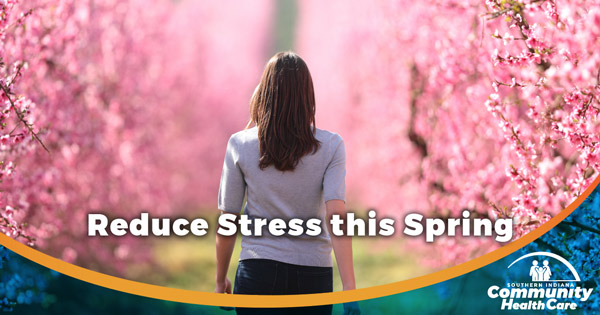Three Ways to Reduce Stress this Spring

By Curtis Thill, MD •
After 30 years of practicing medicine in the region, there’s one trend I commonly see: many pains and symptoms some of my patients experience probably are (at least in part) due to unresolved stress. And no wonder, given the challenges we all face.
So how can we reduce stress? There is good news!
At some point in our lives we will all face stress of some kind. But when stress hangs on, it can lead to the overproduction of the steroid hormone cortisol. Cortisol is typically good for us in the management of blood sugar levels, blood pressure and lowering inflammation.
When cortisol is high for a long time, it can raise blood pressure and blood sugar, and cause other issues. So if you feel stressed out and anxious or are under a lot of stress at work or home, it’s good to recognize that and take steps to reduce stress. Here’s a few steps to consider:
Take advantage of spring weather and get active
You’ve probably heard this from me or other providers, but it’s worth repeating. Regular physical activity and exercise plays a major role in how your mind and body responds to stress and anxiety. When we don’t exercise or are generally sedentary (being inactive and sitting around), we can experience sour moods and poor sleep.
So find something you like and do it! This includes walking, biking – or if you like, running and working out. Try to exercise at least 30 minutes three times a week – you’ll be pleased with the results.
Plant a garden and eat fresh food
I personally love to garden. And I like the fresh vegetables and fruit that come from gardening. If you haven’t tried gardening or haven’t done it for a while, think about it.
There are many benefits to working in a garden. Getting out and working with plants actually improves many people’s mood. Gardening is a known stress reducer.
Don’t know how to get started? We have community gardens in Crawford County (and the region) with people who can help you. There are plenty of online resources, as well as many, many books on gardening.
Living in Indiana means access to plenty of fresh food. Eating salads and fresh vegetables can promote good health, which improves mood and helps reduce stress. From raw to roasted, vegetables offer important nutrients that your body needs.
Consider mindfulness techniques
Practicing mindfulness and meditation can help you live in the moment and reduce tension. Lots of stress and anxiety can result from worrying about the future. Practicing mindfulness techniques can help you stop worrying about future possible traumas and focus on positive principles.
We at Southern Indiana Community Health Care have been partnering with area elementary, middle and high schools to teach students key mindfulness techniques. If you’re wondering how to get started. Check out the Team Peace short videos on our YouTube channel. Visit https://www.youtube.com/@sichc_healthcare and try out a view of the breathing and other exercises.
You can reduce stress, whatever your age and location. Do it today and enjoy the spring season!
Practicing medicine in the Crawford County region for more than 30 years, Dr. Curtis Thill is a board-certified family physician.
